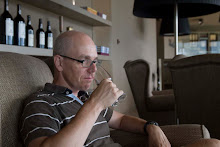The fascinating and perhaps most surprising observation about Portugal is its national psyche. Forget any notions of Hispanic passion or Latino love of life. Certainly, the Portuguese enjoy life - the just don't show it too often. Fado music - like most folk music spurned by the young, of course - concisely sums up the national mood. The idiom is one of tranquillity and understatement. Ostentation is rare. Conservatism commonplace. Sara, my Portuguese partner, is regularly exasperated by the Portuguese bureaucracy but also sometimes too by the Portuguese character.
With a hitherto farming-based economy and gripped by a 20 year torpor of the Salazar legacy, in the 1990's Portugal began to change, particularly with the help of EU money. Generally the road infrastructure is excellent. Main roads and motorways are superb but their regular emptiness partially reflects the stuttering economic progress. Porto and Lisbon are dynamic cities with a burgeoning IT industry and the usual trappings of urban European life - high quality boutiques, coffee bars, nice hotels, even the Carphone Warhouse and sushi bars. But the middle class remains quite small. Education is variable, as is health care. Whilst quality of life for many Portuguese families is good - partially as a result of low property costs - disposable incomes are often low and there is a lack of money in the economy. Not for no good reason is Portugal the cheapest country to travel to in western Europe. I do see signs of change and growth. Socrates, the forward-thinking socialist Prime Minister seems determined to take on the moribund and creaking (and very large) public sector and develop growth away from the popular tourist region of the Algarve. There is evidence of change. New housing, retailing, new Ikeas some to be everywhere. As an informed outsider, I often think there is vast potential to develop Portugal's rural economy. There are only two real national parks, haltingly managed with unrealised potential. The countryside could be developed sustainably for nature tourism, accommodation, cycling, rambling, even for hunting (which the indigenous population loves). They have a fantastic wine industry. Wine tourism could really take off with some entrepreneurism.
I do love Portugal, its land and its people and feel its time will come. However, there are some things I find frustrating. For example, smoking is still a problem and quite a shock for the northern European traveller. Portugal has lovely pastelarias selling a delightful range of pastries and strong, fresh coffee. But these often cramped places, typically with stand-up bars, usually allow customers to smoke with impunity, often blowing their disgusting fumes over the serving area. Of course, the same could formerly be said of Belgium and France but the smoke-free legislation is spreading. Spain already has it, England was dragged kicking and screaming into the 21st century when it brought in smoke-free legislation in July 2007, so hopefully my second home won't be too far behind (1st January 2008 apparently).
Some things happen slowly in Portugal. Utilities and telecommunications remind me of Britain under Labour in the 70's. Internet access, especially broadband. is sporadic and largely absent in some areas - it strikes me that this is something crucial to address for the country's future. Home web access and PC use is close the bottom of the league for western Europe. There must be an untapped potential for e-commerce and the knowledge economy, given the saturation use of mobile phones by Portuguese youth.
To be continued......
Sent using BlackBerry® from Orange
See Gary's work at www.garywhite-photography.com


3 comments:
Hi Gary,
You sound a bit disappointed about Portugal's laid back, unsophisticated lifestyle.
You say "I often think there is vast potential to develop Portugal's rural economy." Sounds like you're keen to see their carbon footprint go up.
Maybe those of us in the over-developed nations could learn a thing or two from the Portuguese about slowing down a little, and reducing our resource consumption.
And don't give me all that "sustainable tourism" nonsense. Any tourism that encourages people to travel long distances is going to result in carbon emissions, and therefore isn't sustainable.
But do have a nice trip .... ;-)
David, I don't think it is as simple as you are making out. I agree that we shouldn't encourage over-development and increase carbon footprint. But my point it that there could be appropriate development in Portugal which would aid the country. In fact I am writing an article at the moment about the potential for cycling growth in rural Portugal. Watch this space! Gary
I like to be provocative!
Post a Comment